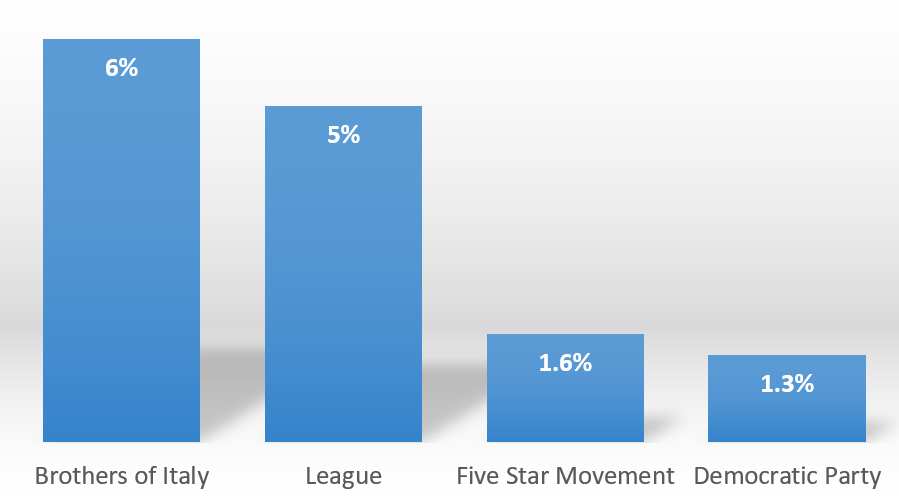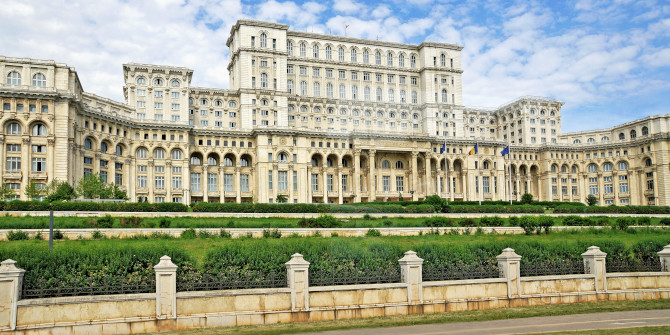Recent opinion polls suggest that two radical right parties – the League and the Brothers of Italy – could top the vote in the next Italian general election. Giovanni de Ghantuz Cubbe assesses how both parties have framed the issue of immigration during the Covid-19 pandemic.
In Italy, the issue of immigration is most often raised by two parties in particular: Matteo Salvini’s League and the right-wing Brothers of Italy party. This is unsurprising as the strong politicisation of immigration – especially since Europe’s migration crisis in 2015 – is frequently tied to the mobilisation strategies of populist radical right parties.
This pattern was evident in the party manifestos published in advance of the last Italian general election in 2018. As shown in Figure 1 below, while 6% of the Brothers of Italy manifesto and 5% of the League manifesto contained immigration keywords, the issue was referenced far less frequently by the Five Star Movement (1.6%) and the Democratic Party (1.3%).
Figure 1: Percentage of phrases in 2018 Italian election manifestos that contained immigration keywords
Note: This chart was compiled using manual coding by the author based on the following immigration keywords: immigrant(s) (immigrat); immigration (immigrazione); refugee(s) (rifugiat); asylum (asilo).
While this was the case prior to the 2018 Italian general election, there is some evidence that the pandemic has resulted in a decline in the salience of immigration for Italy’s radical right. Between January 2019 and March 2020, around 10% of the League’s Facebook posts contained immigration keywords. Between March 2020 and April 2021, in contrast, this percentage sank to just 7%, as shown in Figure 2 below.
Figure 2: Percentage of the League’s Facebook posts that contain immigration keywords
Note: Compiled by the author.
Nevertheless, immigration remains a central focus of both the League and the Brothers of Italy. This is true in particular for immigration from northern Africa, which they have presented as a health threat. One recent Facebook post by a member of the Brothers of Italy, for instance, states: “The Italian health situation is already precarious enough. It will get worse due to the continuous landings on our coasts and due to the lack of controls with respect to the illegal arrivals of immigrants.”
Moreover, both parties construct contrasts between Italians and immigrants, not least by implying a vague sort of relative deprivation of the former with respect to the latter. Whereas the government “treads on Italians’ fundamental rights” by restricting their freedom of movement, immigrants are allowed to “land freely in Italy and to scatter everywhere”. In addition, the population’s unreliable access to medical resources in the pandemic is contrasted with allegedly too generous immigration policies, which provide “illegal immigrant” facilities. As one Facebook post by the League puts it, “there are free hotels for illegal immigrants but no hospital beds for sick people”.
Last but not least, the Italian radical right has exploited the pandemic and the issue of immigration as part of its protest against the “elite”. A central target is the Democratic Party, which has argued for expansive reforms of Italian citizenship during the pandemic. A Brothers of Italy Facebook post from March states that “while Italy is locked down because of the restrictions and vaccines are lacking, the PD wants birthright citizenship for immigrants”. Meanwhile Giorgia Meloni, the leader of the Brothers of Italy, has claimed that “while… 460,000 small companies risk ruination, the left keeps on with its mad ideological positions and its blind pro-immigration obsession”.
In this context, however, there is a notable point of difference that divides the Brothers of Italy and the League. While the former has continuously been an opposition party, the League joined the government of Mario Draghi in February. This had an important consequence: even if the League has not abandoned its anti-immigration and anti-establishment stances, its position as a government-partner has forced it to support Draghi’s policies. On several occasions, for example, the party has praised the government for “listening to Italians’ needs” and for having invested “two billion euros in vaccines”. But will the League actually support Draghi’s government until the next general election in 2023?
The fact that the League and the Brothers of Italy have consistently held a combined 40% of support in opinion polls gives some reason to doubt whether the current arrangement will continue. Were Italians to head to the polls tomorrow, these two parties would likely win control of a parliamentary majority. Consequently, we should not rule out the possibility that the Italian radical right will soon start to challenge the establishment once again.
Note: Unless otherwise stated, data and quotes are from the databank of the Mercator Forum Migration und Demokratie (MIDEM) for the forthcoming “Annual Study 2021” (Data Processing: Dr Mariana Mendes / original data from CrowdTangle). All translations from Italian are the author’s. The article gives the views of the author, not the position of EUROPP – European Politics and Policy or the London School of Economics. Featured image credit: European Council






